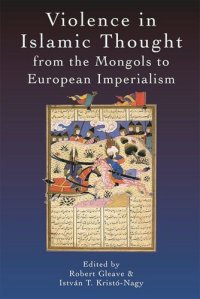
Ebook: Violence in Islamic Thought from the Mongols to European Imperialism
Author: Robert Gleave, István Kristó-Nagy
- Year: 2022
- Publisher: Edinburgh University Press
- Language: English
- pdf
Examines the development of Muslim theological, legal, literary and cultural discussions about violence and its legitimation
The violent conquest of the eastern part of the lands under Muslim rule by the Mongols marked a new period in the history of Islamic civilisation and in attitudes towards violence. This volume examines the various intellectual and cultural reactions of Muslim thinkers to these events, both within and without the territories subjected to Mongol control. Each chapter examines how violent acts were assessed by Muslim intellectuals, analysing both changes and continuity within Islamic thought over time.
Each chapter is structured around a case study in which violent acts are justified or condemned, revealing the variety of attitudes to violence in the medieval period. They are framed by a detailed introduction, focusing on theoretical perspectives on violence and religion and their application, or otherwise, to medieval Islam.
Key Features
- Examines the portrayal of violence in a variety of Muslim intellectual contexts (historical, philosophical, theological, legal, literary, artistic)
- Employs a broad understanding of violence – from warfare between Muslims (and between Muslims and others) to individual acts of violence
- Enables a better-informed debate about the nature of violence in Islamic thought, and how the positions developed in early Islam were both used and abandoned by later writers
- Positions these classical conceptions of violence and its justification in Islamic thought in the broader methodological debate over violence and its relationship with religious thought